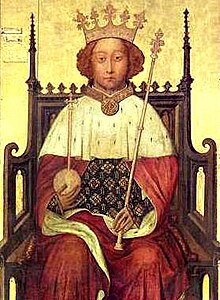Richard II of England
Appearance

Richard II (6 January 1367 – c. 14 February 1400), also known as Richard of Bordeaux, was King of England from 1377 until he was deposed in 1399. Richard's father, Edward the Black Prince, died in 1376, leaving Richard as heir apparent to King Edward III. Upon the death of his grandfather Edward III, the 10-year-old Richard succeeded to the throne.
Quotes
[edit]- I am your leader: follow me.
- Remark to the peasants at Smithfield, London, during the Peasants' Revolt, quoted in Gwilym Dodd, The Reign of Richard II (Tempus, 2000), p. 20
- You wretches detestable on land and sea: you who seek equality with lords are unworthy to live. Give this message to your colleagues: rustics you were, and rustics you are still; you will remain in bondage, not as before, but incomparably harsher. For as long as we live we will strive to suppress you, and your misery will be an example in the eyes of posterity. However, we will spare your lives if you remain faithful and loyal. Choose now which course you want to follow.
- Speech to the peasants at Waltham, Essex (22 June 1381) according to Thomas Walsingham, quoted in Nigel Saul, Richard II (Yale University Press, 1999), p. 74
Quotes about
[edit]
- Richard II’s reign was a personal and political tragedy. As a ruler, he was rigid, inept, inconsistent, paranoid, untrustworthy and vindictive — yet he was also a refined patron of the arts and the boy king who bravely faced the terrifying rebellious mobs of the Peasants’ Revolt. Richard’s tragedy was to succeed to the throne as an unprepared, callow and foolish child in the shadow of his grandfather Edward III, one of the most heroic of English kings, and his father, the Black Prince, paragon of knighthood.
- Simon Sebag Montefiore, Monsters: History's Most Evil Men and Women (2009), p. 105
- Fair laughs the morn, and soft the zephyr blows,
While proudly riding o’er the azure realm
In gallant trim the gilded vessel goes;
Youth on the prow, and Pleasure at the helm;
Regardless of the sweeping whirlwind’s sway,
That, hush’d in grim repose, expects his evening prey.- Thomas Gray, The Bard: A Pindaric Ode (1757), II.2

